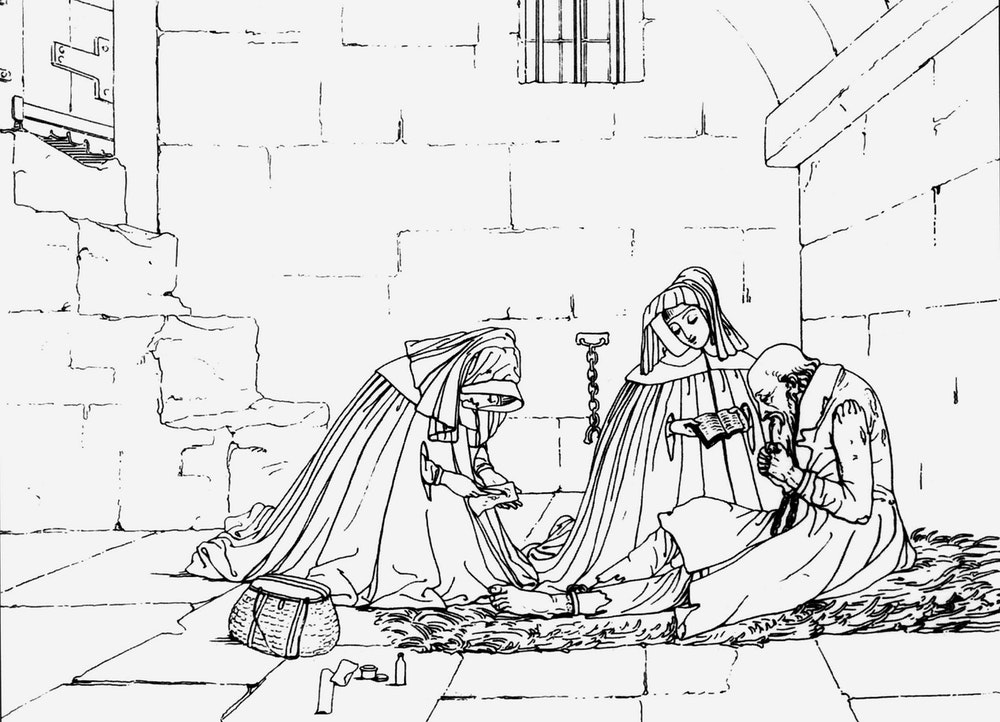In this year’s Lenten reflection series, seven sisters offer their personal stories and insights on each of the Corporal Works of Mercy and how acts of mercy can have a profound impact on the lives of our sisters and brothers. Accompanying these reflections are line drawings by Sister Mary Clare Agnew, a contemporary of Catherine McAuley, which illustrate the Sisters of Mercy in ministry in 1830s Ireland. The reflection series also includes reflections for Ash Wednesday, Palm Sunday, Holy Thursday and Easter.
By Sister Natalie Rossi, Campus ministry, Mercyhurst University, Erie, Pennsylvania; On staff, State Correctional Facility at Cambridge Springs, Cambridge Springs, Pennsylvania
To find the genuine in oneself is to find God.
Does one find God in prison? One could say one is overwhelmed with the Presence of God in prison.
“We see because we are seen. We love because we are loved.” (Edward Hahnenberg)
I have worked in prison ministry for about 20 years, not all at one time. The women I see or talk with open their hearts to God. They want to be seen for who they are, a person created by God in God’s image. They have hit bottom and are reaching for something to bring them peace and healing. They are ripe for Jesus.
The hardest part is to help them believe that they are good because God dwells within them. God doesn’t leave them.
When COVID-19 hit, I was fortunate because I am under contract with the diocese to work in the prison and so could continue to go in. Volunteers could not. I offered spirituality and art. But the most important activity that I did was to visit the units and each person.
They wanted to be seen. Just that little visit brought many “thank yous.” Just letting the women know that God loves them brought so much peace.

Currently, in many prisons and jails, volunteers still can’t visit. So where else can we find the imprisoned besides a state women’s prison at Cambridge Springs?
I meet them every day at Mercyhurst University. Students struggling to be OK with themselves—to find meaning in their lives—to believe that they are loved—that God is with them. You are OK because God created you in God’s image—whether a person be straight, LGBTQ+, Black, white, autistic, disabled, etc. We are all one—same DNA—all created by LOVE.
Look around at your neighbors, relatives and friends who struggle to believe in themselves. Many are imprisoned within themselves.
How do we free those who have imprisoned themselves? How do we free ourselves? The answer is love—Luke 6:27-38.
Look around and be aware this Lent. Young persons, the elderly, perhaps, all of us struggle with being accepted for who we are. So many times, persons become who they think people want them to be, and, if not, they believe they are less than.
How do we free ourselves and others from the prisons we have put ourselves in?
“Everything is filled with sacred presence.” (Psalm)
“We are not called by God to do extraordinary things, but to do ordinary things with extraordinary love.” (Jean Vanier)
Inmates are aware that they are imprisoned. This Lent, become aware of how we are imprisoned and of how many who are walking around us are also imprisoned.
This Lent, set aside quiet time to be with God. Or become aware that God is everywhere; so be aware of God in all things, especially the persons with whom you come in contact. Make it a point to greet each person with a smile. Pray especially for people you judge or don’t like. Send God’s love to them. Let God heal…or heal you to accept the person for who they are at this moment. We all possess God.
Pray during this Lent to not judge people and to forgive wrongs that have been done to you. Spend time offering the silence up as a time of love for others. It is easy to give up food for Lent, harder to give up judging and non-forgiving.
This Lent, put more tenderness into the world, and the world we live in will become a more loving place.
Everything is nothing but the expression of God’s exuberance.